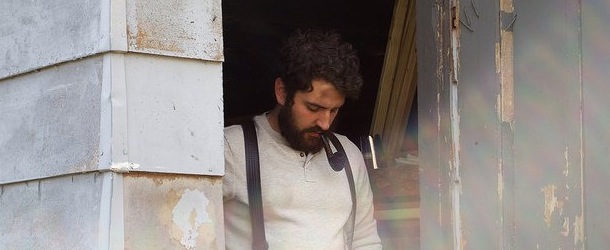(Editor’s note: This review previews South of Lincoln’s CD release show for The Monsters/Bathroom Sessions Sunday, June 26 at Duffy’s starting at 6 p.m. with Archaeology, Kyle Harvey and Plains.)
by Michael Todd
I can’t remember the last time I cried listening to music. Maybe it’s never happened before.
But three songs into South of Lincoln’s The Monsters/Bathroom Sessions, and I was broken. Max Holmquist, with a smile and sense of humor as infectious as any, sings and turns into a ghost, only he’s the one seeing through you. You’re just as imperfect as the archetypes of others and of the self he embodies with his voice. And through the sadness, you’re renewed.
Following his debut earlier this year, Max hasn’t moved very far from home with this seven-song EP. He bookends the dirges with “Coming Home” and “Riverside,” but neither finds much resolution with lines like “I can’t cry no matter how hard I try / The paint on your face doesn’t make you the same.”
But then again, I’m belittling the power of Max’s songs by transcribing them to print. Perhaps there’s not an intrinsic beauty to his words. You can’t read, “Hey there, boy, what you say / There must be a better place / Broken jaw, busted heart, bloody face,” and sense the same twisted feeling within yourself becoming slack as you do when you hear the words sung. This young folk singer from Douglas, Neb., inflects his voice with an imported accent, and you find yourself in the midst of a home being transported to a distant land. It’s got some kind of magic to it.
Father, Mother, Sister, Brother-South of Lincoln from Frontier Project on Vimeo.
That said, I understand many music-lovers don’t get folk music. All too often, singer-songwriters use the genre as an excuse to be dull. They attach themselves to the culture and the history of storytellers who use inflection, cadence and the right three or four chords and no more to beg people to listen. Those who wrongfully co-opt such a time-earned trade do so, unfortunately, for self-aggrandizement.
But the ones who do it right, the ones who connect, they don’t play folk music but rather let folk music play them. Max isn’t the same person with his Martin strapped on. He turns into the “Prowler.” He sets the scene with an alternating diminished chord and beats it down until a move up to the fourth seems to be the only way he can go. He lets words dangle in the air, twists them with extra vowels at the end, lets them take him where they want to go.
He turns into “Thirteen,” a victim of abuse, singing, “Hope that you learn your lesson / You had better stop testing me / Hope that you learn your lesson / Time to grow up 13.” His strumming pattern never changes for five minutes and 20 seconds, pulling on the tenor of the song so the very threads are taut and tenuous until the last note dies away.
Suffice it to say, I think Max is one of the best songwriters in Lincoln, if just a little south of the city limits. And what allows The Monsters/Bathroom Sessions to flourish is its presentation. The adornments on his first album, Homes, are absent. The first three tracks place the songs in a studio with air-conditioner noise, throat-clearing and sniffling, all recorded to tape. The last three tracks take them to a forest at Wilderness Park.
All that’s left is the soul-searching sound of Max’s voice and his guitar. Just the way it’s supposed to be.
Aural History: Maxwell Beardsley Holmquist's Music Documentary from Robert John Morrison on Vimeo.
Michael Todd is a summer intern for Hear Nebraska. If you hear he has gone missing, check Max's chest hair. It's like the Bermuda Triangle. Contact Michael at michaeltodd@hearnebraska.org.




